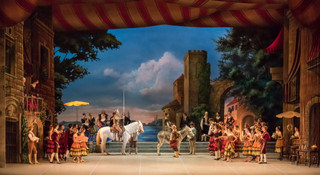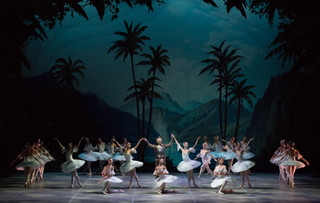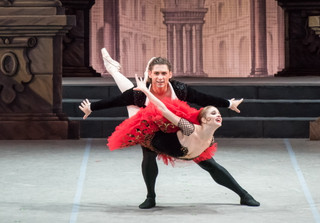|
Back
Invincible Vasiliev, Implacable Shtick Orange County
Segerstrom Hall
11/09/2018 - & 10, 11 November 2018
Don Quixote
Ludwig Minkus (music), Marius Petipa and Alexander Gorsky (Original choreography), Nina Anisimova, Igor Belsky, Robert Gerbek, Kasian Goleizovsky and Fyodor Lopukhov (Additional choreography)
Angelina Vorontsova*/Anastasia Soboleva (Kitri/Dulcinea), Ivan Vasiliev*/Victor Lebedev (Basilio), Alexander Omar*/Philip Hedges/Adrian Mitchell (Espada), Alexey Malakhov (Don Quixote), Alexey Kuznetsov (Sancho Panza), Svetlana Bednenko*/Andrea Lassáková (Queen of the Dryads/variations/Grand pas), Anna Kuligina (Cupid), Pavel Maslennikov (Gamache), Roman Petukhov (Lorenzo), Ella Persson*/Valeria Zapasnikova (street dancer), Tatiana Miltseva, Nailya Latypova (flower girls/Kitri’s friends), Victoria Zaripova (Mercedes), Sergey Strelkov, Mariam Ugrekhelidze (gypsy dancers), Alla Matveyeva, Konstantin Tkachuk (fandango), Valeria Zapasnikova (variations), Irina Zhalovskaya, Debora Davis, Elena Trushina, Kristine Moe, Yulia Lukyanenko (Grand pas), The Mikhailovsky Ballet
Vladislav Gluz (violin), Ivan Korenev (cello), Elena Arkhipova (harp), The Mikhailovsky Orchestra, Pavel Sorokin (conductor)
Mikhail Messerer (stage director), Vyacheslav Okunev (set and costume designer), Alexander Kibitkin (lighting designer)

Mikhailovsky Ballet (© Doug Gifford)
St. Petersberg’s Mikhailovsky Ballet has landed, once again, in Orange County after last year’s successful piratical Le Corsaire and 2014’s revolutionary Les Flammes de Paris. Now the esteemed company turns to Ludwig Minkus’ Iberian-flared perennial favorite, Don Quixote, in what can be deemed as brilliantly valiant while coursing like a roller coaster in an amusement park.
Don Quixote’s unifying strength rests in the hands (and boldly muscular legs) of “Russian Rocket Man”, Ivan Vasiliev: this gymnastic hunk is just as tight in his package as he is in his turns in the rôle of the charismatic Basilio. And while this boundless energy (accentuated by oft impromptu movements) permeates enthusiasm amongst fellow corps members, Angelina Vorontsova isn’t necessarily the most epitomized Kitri: her overly tomboyish movements are mathematical and masculine, losing traceability of feminine refinement with off-centered pirouettes...within several passages she hints a limp(?)
Pavel Sorokin’s music absurdly and frenetically blisters away in the Prologue and Act I, so much so that dancers’ footwork gets frequently scuffled while lines lose crispness. Culling from Gorsky’s Grand Pas des toréadors we find Vyacheslav Okunev’s flamboyant burgundy capes flailing away to the dilution of geometrical statements.
The pace at which we’re introduced to so many characters (i.e. the foppish Gamache and the bullying innkeeper, Lorenzo, and a mischievous Mercedes) blossoms from poliment comique to sheer buffoonery. This trends as mocking Cervantes and aligning more to an outrageously ill-behaved Bournonville (Napoli) mime. [Take note: humor runs a fine line, and it’s hard to execute!] The action gets overly Keystone Cops-ish, and it quickly flows more like a musical revue. Even poor Sancho Panza (Alexey Kuznetsov) is pathetically tossed around, reminiscent of Goya’s The Straw Manikin (1791) that augurs the puppet fiasco of Act II, Scene II. Bottom line: Mikhail Messerer & Company try too hard.

Corps de ballet (© Doug Gifford)
Moving into Acts II and III, M. Sorokin’s tempo is more tempered. This gives us a “breather”, and much can be said about the beauty inside Act II, Scene III’s “The Enchanted Garden of Dulcinea.” Back dropped by one of M. Okunev’s bucolic landscapes, the all-white corps de ballet gives a better definition to refined Russian ballet with the added softness as we’re introduced to Anna Kuligina and her diaphanous pixy character, Cupid. Svetlana Bednenko’s The Queen of the Dryads could be heralded as one of the most elegant and stately pas in this Don Quixote with her multitudinous arabesques penchées flowing seamlessly and graciously. Alexey Malakhov plays a respectable and properly formulated Don Quixote: Cervantes’ centerpiece engages by checking out aloofness at the door and experiencing his own senses by the actions he disembogues.
Mikhail Messerer chooses to revert back to Petipa’s second version from 1871 by closing with the Kitri/Basilio marriage held at the Duke’s castle. While the entourage takes after Renaissance opulence (as would be keenly found inside an elegant Prokofiev Romeo and Juliet), the Grand pas finds the corps elegantly dressed todo blanco of traditional Spanish finery that succors enhanced lines. This refinement is carried forward into the “Fandango” with savoir faire by the poised pairing of Alla Matveyeva and Konstantin Tkachuk.

A. Vorontsova, I. Vasiliev (© Doug Gifford)
The concluding Pas de deux has Ivan Vasiliev closing out his Olympian acrobatics in robust form, wearing a winning smile. And while he’s clearly in his element, Mlle. Vorontsova’s relentless fouettés are recognizably “to the point.”
Perhaps the joint conference in the choreography department has produced too many chiefs and too few Indians. Sadly, this Don Quixote composite doesn’t live up to what balletic continuity M. Messerer commanded in the 2017 Le Corsaire...invincible and implacable, all under the same tent at the same time.
Christie Grimstad
|